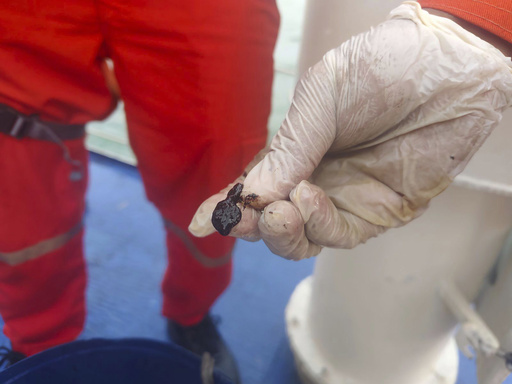MANILA, Philippines (AP) — There is no indication that a big cargo of industrial fuel oil stored in a tanker that sank in stormy weather in Manila Bay has started to leak, the Philippine coast guard said Friday, and plans are being firmed up to try to siphon off the highly toxic shipment to prevent a major spill that could reach the bustling capital.
The tanker Terra Nova had left Bataan province en route to the central province of Iloilo with about 1.4 million liters (370,000 gallons) of industrial fuel oil stored in watertight tanks when it got lashed by huge waves and took on water. The crew struggled to steer the tanker back to port but it eventually sank shortly after midnight Thursday. The coast guard rescued 16 crewmembers but one drowned, coast guard spokesperson Rear Adm. Armando Balilo said.
“We’re racing against time to siphon off the oil to avoid an environmental catastrophe,” Balilo told reporters, adding that the plans could be hampered if the weather turns bad.
An oil slick about 3.7 kilometers (2.3 miles) long near the rough seawaters where the tanker sank, about 6 kilometers (3.7 miles) off Bataan province’s Limay town, came from the fuel tank that powered the tanker and not from its cargo, which was stored in watertight tanks, Balilo said.
The sunken tanker’s owner has contracted a private company to undertake the oil siphoning, which could take a week, Balilo said. Philippine coast guard officials would get the detailed plan from the company Friday to allow the coast guard to brace for contingencies during the delicate undersea operation, he said.
Three coast guard ships with personnel and equipment for oil spill containment have been deployed to the area where the tanker sank.
There have been days of monsoon rains, exacerbated by a passing offshore typhoon, that set off landslides and flooding across the Philippine archipelago, leaving at least 32 people dead and displacing more than 800,000.
“There’s a big danger that Manila would be affected, its shorelines, if the fuel leaks because this happened within Manila Bay, Balilo said, ”We’re preparing for the worst.”
The 65-meter (213-foot) oil tanker is lying at a relatively shallow depth of 34 meters (111 feet), based on an initial assessment. Coast guard personnel aboard a ship were able to witness and take pictures of the sinking tanker so they know the general area where it went down but divers are waiting for better weather to try to reach the vessel for an inspection, the coast guard said.
Balilo compared the magnitude of the possible oil spill to one caused by the sinking of another Philippine oil tanker, the MT Princess Empress, which was carrying much less fuel oil cargo, in February last year off Oriental Mindoro province south of Manila. That spill took about three months to contain, caused massive damage to coral reefs and mangroves in a region known for its rich biodiversity, and affected tens of thousands of fishermen and beach resorts.
Manila’s shoreline is a major tourism and business hub, where the main seaport, a historic public park, the U.S. Embassy, upscale hotels and restaurants and huge shopping malls are located. Land reclamation projects are also underway in the bay for upscale entertainment and tourism complexes with casinos. The bay for years has been notorious for its pollution but famous for its picturesque sunsets.
This website uses cookies so that we can provide you with the best user experience possible. Cookie information is stored in your browser and performs functions such as recognising you when you return to our website and helping our team to understand which sections of the website you find most interesting and useful.
